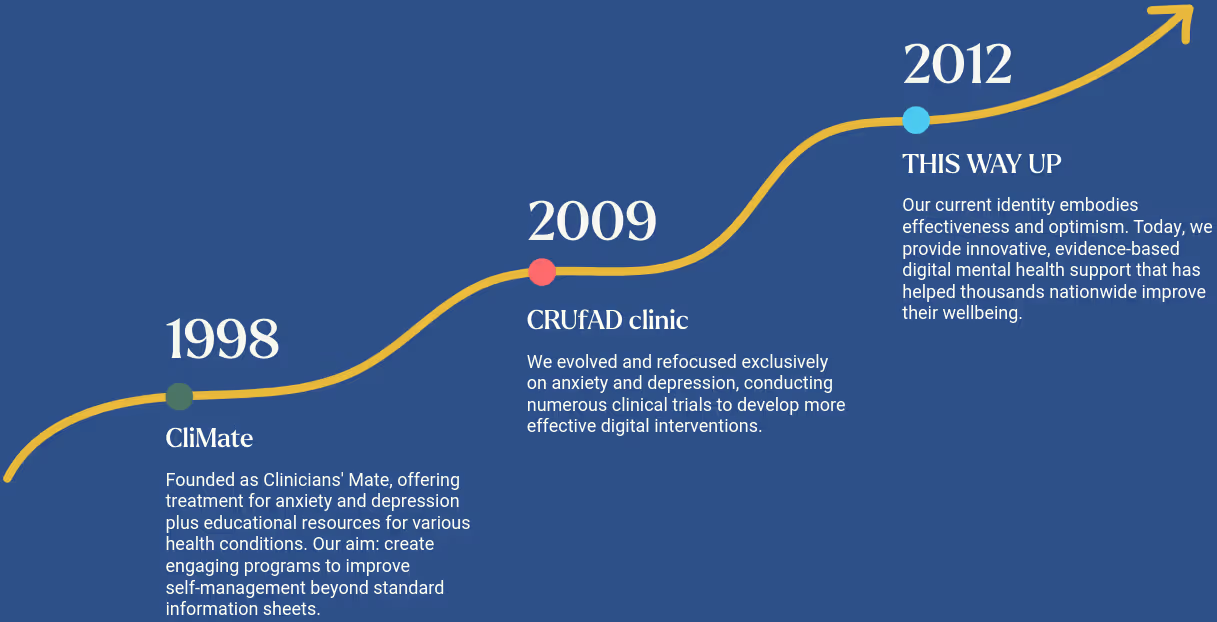Mixed Anxiety and Depression Explained
What is mixed anxiety and depression?
It can be tough to deal with both sadness and worry at once. Not only do you have to manage the pain that these emotions cause, you also have to deal with the difficult situations that triggered these emotions to begin with. Of course, it’s normal to feel sad or worried when facing tough times; these emotions are an inevitable part of life. Sometimes however, sadness and worry can take a toll on us. These emotions can be intense, last longer than we’d expect, or creep up on us, without us really knowing why. If you feel like sadness and worry are impacting your well-being and ability to enjoy life, then this information on anxiety and depression might be helpful for you.
Anxiety is intense fear or worry, while depression is a lasting period of low mood, low motivation, and low energy. Although anxiety and depression can occur on their own, many people experience both at the same time. Excessive worrying can make you feel flat and down, feeling depressed can make you more likely to worry, and both can be triggered by stressful situations.
It is normal to feel flat and worried from time to time, especially when you’re going through a stressful time. However, persistent and intense feelings of depression or anxiety can stop you from enjoying life. If you’re feeling worried, tense, flat, upset, or unmotivated nearly all the time, then this information may be helpful for you.

Not sure whether to seek help?
If you’re unsure about the way you feel, take our anonymous Wellbeing Test to check whether your levels of stress, anxiety, or depression are within a healthy range, and see if one of our online programs could help.
What causes anxiety and depression?
There isn’t one specific thing that causes anxiety and depression. In fact, anxiety and depression are most likely caused by a combination of factors.
There’s good evidence that genes play an important role in anxiety and depression. These disorders run in families and having a parent or sibling with a mental health disorder can increase your risk of having anxiety or depression.
Stressful life events also play a part in the development of anxiety and depression. Stressful situations like unemployment, illness, childbirth, divorce, financial insecurity, moving, retirement, or starting a new job can have a significant impact on your mental health. Ongoing conflicts with others, loneliness, and the loss of someone or something important can also take their toll on our well-being.
Your personality structure can also influence how you feel. For example, being self-critical or perfectionistic, setting high standards for yourself, or being someone who tends to see ‘the glass half empty’ can increase your risk of developing anxiety and depression.
Another cause that should not be overlooked include physical illness, substances, and medications. Glandular fever, influenza, hepatitis, thyroid hormones, anaemia, diabetes, birth control pills, alcohol and other substances of abuse, or other medications such as those for heart or blood pressure conditions, may all cause symptoms of anxiety or depression.
Anxiety can also cause depression to develop, and vice versa. Feeling constantly worried and on edge can leave you feeling tired, negative, and unmotivated. It can be hard to get excited about things or enjoy yourself if you’re constantly worrying. Likewise, people with depression often think negatively and expect the worst to happen, which can make them worry about themselves, the future, and what other people think of them. It can be a vicious cycle.
How can I deal with anxiety and depression?
There are many different treatments for anxiety and depression. Fortunately, a lot of these treatments are effective for both, including Psychoeducation, Cognitive Behavioural Therapy (CBT), and medications.
Psychoeducation
Psychoeducation refers to learning about how anxiety and depression develop, and what keeps them going. This kind of information is extremely valuable. This knowledge base can potentially give someone greater control over his or her disorder, which can, in turn, reduce feelings of uncertainty and helplessness, and increase a sense of well-being. Providing education for families or carers is also helps them offer support.
The most important pieces of information for a person with anxiety and depression are:
- Depression and anxiety are common disorders.
- Depression and anxiety are not a sign of weakness or a character defect.
- Treatment is effective, and there are many treatment options available. There is a suitable treatment for most people.
- Recovery is the rule, not the exception.
Cognitive Behavioural Therapy (CBT)
CBT is an excellent treatment for depression and anxiety, alone or in conjunction with medication. CBT involves learning skill to:
- Manage the negative thoughts that characterise anxiety and depression
- Combat the emotions of sadness and hopelessness, and loss of energy, even when not physically active.
- Overcome the feelings of fear and worry, and re-engage in activities you may have stopped doing because of anxiety
CBT will often be recommended when:
- The person has found CBT helpful in the past.
- The person wants to take an active role in their recovery.
- The person wants to learn skills to help them get well and stay well.
- A competent, trained clinician who has expertise in CBT is available, or the person is prepared to use internet CBT (iCBT)
- The person does not want to take medication or there is a medical reason that they cannot take antidepressant medications.
- The person prefers CBT or iCBT.
Medication
For some people, medication will be the first line of treatment for anxiety or depression. Although these medications are generally called ‘antidepressants’, they are effective for both anxiety and depression.
Medication is generally recommended if someone is experiencing severely depressed mood or very intense worry. For mild to moderate depression, antidepressant medications are not often recommended as a first line treatment.
Different antidepressant medications work in different ways. You may need to trial more than one type to find the medication that works best for you. Make sure to keep in close contact with your prescribing physician during the early stages of taking medications the side effects can often be difficult to deal with.
Some things to remember when taking these medications are:
- Take the medication as prescribed.
- Don’t stop the medication without contacting the health professional who prescribed it.
- Side effects lessen as your body adjusts. If the side effects don’t diminish, or are unreasonable, contact your health professional.
- Don’t stop the medication when you feel better or your depression may return.

How can Cognitive Behavioural Therapy (CBT) help with anxiety and depression?
Cognitive Behavioural Therapy or CBT is considered to be one of the leading psychological treatments for both anxiety and depression. All of our online courses use CBT strategies to help you ease symptoms and look after your mental health. Click below to see if CBT can help you tackle your symptoms to improve the way you feel.
How can I cope with the symptoms of anxiety and depression?
Sometimes, a few simple changes can make a big difference to how you feel. Here are just a few ways you can deal with the symptoms of anxiety and depression.
Managing muscle tension
- Inactivity can make muscle tension worse. Try to stand up and move around a little throughout your day.
- Do some gentle stretches in the evening, to release tension and increase feelings of relaxation.
- Take some time out of your day to breathe deeply and purposefully relax your muscles, from your head to your toes. You might be surprised at how much tension you hold during the day without even realising.
- If your muscle pain is intense or persistent, see your doctor or a physio for further advice.
Tackling sleep difficulties
- Get up at the same time every morning.
- Avoid sleeping during the day.
- Reduce tea and coffee intake if excessive (no more than two or three cups per day and none after about 4:00 p.m.).
- Do not lie awake for more than about thirty minutes—get up and find a relaxing activity.
Reducing worry and unhelpful thinking
Put your worry to a useful purpose. Rather than endlessly pinpointing your problems, pick out one or two that seem really important and make a decision to resolve them. You may like to ask a friend to help you.
Go through the following steps:
- Say exactly what the problem (or goal) is.
- List five or six possible solutions to the problem. Write down any ideas that occur to you, not merely the good ideas.
- Evaluate the good and bad points of each idea in turn.
- Choose the solution that best fits your needs.
- Plan exactly the steps you will take to put the solution into action.
- Review your efforts after attempting to carry out the plan. Praise all efforts. If unsuccessful, start again.
Shifting unpleasant thoughts and emotions
Negative thoughts and feelings tend to focus your attention on things that make you feel worried or depressed – these thoughts can make your problems seem worse than they are. People with anxiety and depression also tend to underestimate their ability to cope with these problems. A number of strategies may help you achieve a more balanced view of things:
- Make a list of your three best features—perhaps with the help of a friend or relative. Carry the list with you and read it to yourself whenever you find yourself focusing on negative thoughts.
- Make a list of three difficult things that you coped with better than you expected yourself to. Read this list when you find yourself worrying about how you’d cope if these worries came true.
- Keep a daily record of all the small nice or interesting things that happen and discuss these events with your friends when you see them.
- Keep yourself busy doing useful activities. Avoid having too much idle time to think.



